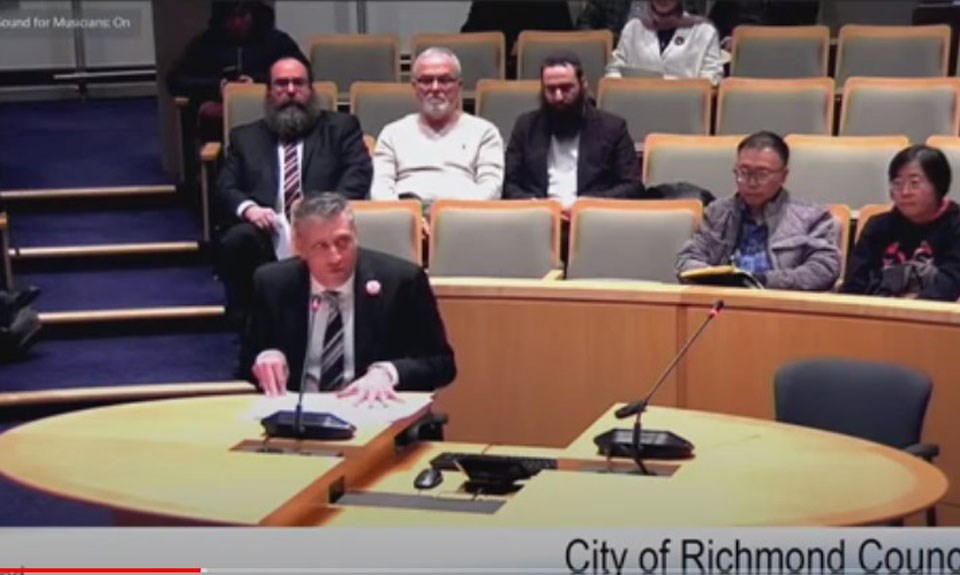A long list of definitions of racism was approved by Richmond city council, but the one that sparked the most discussion – and disagreement - was a definition of anti-Semitism.
A Palestinian activist argued the definition, written by the International Holocaust Remembrance Alliance (IHRA), has been “weaponized” to shut down criticism of Israel, while some Jews who supported the definition, felt it was the right one, especially in the light of their “lived experience.”
Coun. Alexa Loo introduced a motion for city council to endorse the broad range of definitions of racism – used by the Government of Canada – and it included the IHRA definition, which has been supported by five Richmond Jewish groups, and yet opposed by various other groups, including at least one Canadian Jewish group.
This document includes definitions of anti-Asian and anti-Black racism, Islamophobia, colonialism and systemic and institutional racism.
The definitions were in front of council for a final vote after being discussed at length at last week’s committee meeting.
Alisair Guneid, a Palestinian activist and Richmond resident, told city council the IHRA definition has been “weaponized” and “unfairly used to shut down criticism of the Israeli occupation.”
She added that “a significant amount of what’s considered anti-Semitic is just critical speech directed to Israeli human-rights violations against Palestinians.”
The definition has been opposed by some labour groups, the BC Civil Liberties Association as well as the Independent Jewish Voices.
However, Michael Sachs, executive director of the Jewish National Fund Pacific Region, noted there are only a thousand people who are part of the Independent Jewish Voices, out of 335,000 Jews in Canada.
Sachs told councillors that anti-Semitism is “alive and well in our city,” in addition to other forms of hate and discrimination.
“Sadly, there are some who do not wish for our Jewish community and others to define their own oppression and you need to ask yourselves why,” Sachs told city council.
The fact the focus of discussion at the city council meeting, out of 13 definitions, was on anti-Semitism showed the need for these definitions, Sachs said.
“Let me be clear, no one can define anti-Semitism for us, and I would never try to define (other people’s) discrimination for them,” he added.
Sachs told the Richmond News after the meeting that all five Jewish organizations in Richmond sent letters in support of the motion to city council.
The IHRA reads, “Antisemitism is a certain perception of Jews, which may be expressed as hatred toward Jews. Rhetorical and physical manifestations of antisemitism are directed toward Jewish or non-Jewish individuals and/or their property, toward Jewish community institutions and religious facilities.”
As for the question of Israel, former school trustee Norman Goldstein told city council the country is a “bright light in that part of the world” as a liberal democracy.
Furthermore, he felt the restrictions imposed by the IHRA definition of anti-Semitism were “reasonable” restrictions.
“Every regulation, rule or law restricts freedom of some sort, that’s the whole purpose of the regulation, rule or law,” Goldstein said.
Commenting on the concept of Zionism, he added he thinks Jews have an “inherent right” to be in Israel and compared it to the First Nations in Canada who are working toward reconciliation with people who immigrated here.
“The core is the Jewish people are the Indigenous people of the land of Israel,” Goldstein said.
“To say that Jews would not have a special right to Israel, I would call that a racist statement in itself,” he added.
Above council's 'pay grade’
Day said having this definition of anti-Semitism is above their "pay grade." It’s not something she feels city council should wade into, she added.
City council’s business is roads, development permits and parkland, Day said, not to “go with something that’s been brought down by the federal government.”
“I can’t support this today because this is way bigger than the nine of us,” Day said.
Last week, at a committee meeting, an amendment was tacked onto the motion, clarifying that the definition didn’t stop anyone from criticizing any government or state.
But Bilal Khan, a Richmond resident said he felt no state should be mentioned in a definition of racism, referring to examples given with the IHRA definition.
An example of anti-Semitism, according to the IHRA definition, is “Drawing comparisons of contemporary Israeli policy to that of the Nazis”.
In fact, he added, he felt the amendment council added was contradictory to the definition of anti-Semitism, because of the examples given to clarify the definition include references to the state of Israel (these examples weren’t included in the Richmond city council documents).
Coun. Kash Heed echoed Bilal, saying he felt the two pieces of the motion were contradictory.
“If I were to criticize the repressive nature of the Israel government at this time… would I be accused of being anti-Semitic?” Heed asked Bilal, who said, in his opinion, it would be considered anti-Semitic if he criticized Israel.
In response, however, Coun. Laura Gillanders said the examples in the IHRA mention Israel, but they don’t stop the criticism of Israel.
The line of anti-Semitism, however, is crossed when the comparison is made between Israeli policies and the Holocaust, she added.
But Khan said, where free speech is concerned, he should be able to compare, for example, how the Chinese government is treating the minority Uyghur population – which is Muslim – to the Holocaust.
The motion to accept the group of definitions was passed in a 6-3 vote, with Couns. Heed, Day and Michael Wolfe in opposition.
Coupled with the definitions was a motion before city council to approve a “protocol,” created by various Richmond groups, that gives a step-by-step guide for individuals and organizations on how to deal with racist and hate-related incidents – this was approved unanimously by city council.



